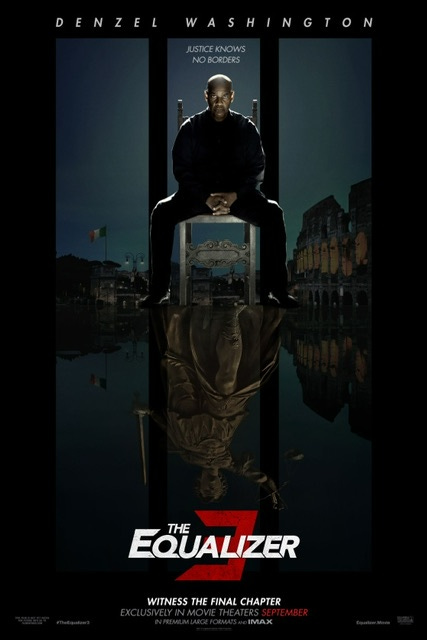Strictly in the context of today’s motion picture quality, which is getting bleaker, this sequel, starring Denzel Washington, excels. It’s emotionally potent. It stimulates the senses and, to a lesser extent, stirs one’s thoughts. The second sequel in the movie franchise based on Michael Sloan’s and Richard Lindheim’s original CBS show makes you scared, horrified and calmed all in one picture. Equalizer 3 is an artful challenge.
The multilayered plot centers upon the mafia. In this sense, and, more than anything, this is probably one of the film’s most original qualities, director Antoine Fuqua brazenly goes against everything in today’s culture glorifying miserable, dark, murderous families (Sopranos, Corleones, various versions of Shakespearean melodrama from Dallas and Empire to Succession). Washington made an awful picture called American Gangster years ago which glorifies thug culture. This movie does the opposite. It’s not exactly redemption, primarily because it’s a horror movie. The moral clarity is absolute.
Washington’s leading character appears like an exhausted and spent nihilist—clad in all-black, like one of Columbine’s trenchcoat mafia murderers, a character out of The Matrix or a priest—looking like 11 miles of bad road. Whether he can become human again, or close to resembling a person, pivots the movie’s plot-theme, integrating a pursuit of justice with finding inner peace. In a movie with some of the most grisly images I’ve seen on film—I looked down throughout Equalizer 3—with heinous acts of evil, the prospect of mining something good here seems almost impossible.
Richard Wenk’s screenplay makes it possible and Fuqua’s direction pulls it off. Equalizer 3 opens with a long, gory display of bloody hell. The savagery depicted cannot be overstated. That the equalizer character squats for a closer kill—after basking in diffused light—suggests that he takes perverse pleasure in exacting justice. This anti-heroism fits Washington’s acting, which at worst tends to be overdone, and he capably inhabits the role. Dakota Fanning co-stars as a U.S. spy involved in pursuing the equalizer’s nemesis: the mafia. Screenwriter Wenk doesn’t romanticize Sicilian mafia subculture. He drives a rusty nail through it. That he intersperses this with goodness—in multiple characters such as a doctor, a policeman and his adorable daughter as well as an older couple robbed of every dollar they’ve saved—culminating in coastal nighttime splendor is an achievement.
Whether a horrific wheelchair suicide as an example to the mafia-oppressed town, an aerial view in the climax at the town square—in this subgenre of the Italian town rallying for its own good—or an inferno, Fuqua slows the action to a spine-chilling crawl with an ominous score tinged with rock and roll. There’s horror to dread about Equalizer 3—which at times sickened my stomach—including the looping siren of an ambulance. Yet, if you listen, watch and mind the craggy old steps that man takes to heal, improve and live to fight again—revitalizing himself to smile, laugh and love again—you may get the reward of this heart-stopping, uncomfortable and poetic film within the gruesomeness.
My guest did. I invited, went and watched it with someone I love—he was spellbound, entertained and unafraid—and I know that Equalizer 3’s made for someone hardier like him. Sony Pictures’s Equalizer 3 (the first of the series I’ve seen) is a detective story. Its mystery lies in summoning light after being steeped in a chamber of horrors. There’s a distinct and quiet nobility in that.





As always, Scott, thank you for the movie review. I've been anticipating the release of Equalizer 3 and hope to see it this weekend. (I have a pretty strong stomach for brutality in movies, when not gratuitous, but I appreciate the heads-up.)